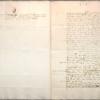
1710 Will of 3rd sister, Delft

This record is associated with the 3 sisters will of 1664. Elisabeth Schoonhoven was the youngest sister and died in 1712. She made her will in 1710.
It may include the sale of the pottery factory 'De Clauw' in Delft?
Any other information would be really helpful for my research into this family, who I believe were Catholic.
Grateful thanks as always.
Anne
Reacties (4)
Dear Anne,
Unfortunately, no mentioning of any pottery. The inheritance this will is about concerns first of all her whole inheritance and later more specifically a debenture ('losrentebrief') worth 6000 guilders and issued by the authorities of Holland and West-Friesland.
She stated that her inheritance should be administered by the executor she appointed. From this inheritance, the executor should annually pay the usufruct and revenues to Jacobus Schoonhoven, her 'neef'. Please note that in Dutch language, 'neef' can refer to a male child of a sibling, but also to a male child of an aunt/uncle. Jacobus will be entitled to this for as long as he would live, but: a) these revenues could not be claimed by any of Jacobus' eventual creditors and b) he was not allowed to trade and/or sell his right to this revenues.
In case Jacobus Schoonhoven would die, the aforementioned debenture should befall to the descendants of her 'nicht' Paulina Schoonhoven, who was living in Amsterdam, widow of Jacobus van Haften (please note that for 'nicht' the same applies as to 'neef', only in the female form). In case Paulina would still be alive by then, Paulina would be entitled to the annual interest on the debenture.
The debenture should remain under the executors and/or legal guardians and should not be divided among Paulina's descendants until the youngest of these descendant would come of age (i.e. got married or after the 25th birthday).
The remainder of her inheritance (i.e. all but the 6000 guilden debenture) would befall to the poor of the Roman Catholic Church 'behind the Markveld' once Jacobus Schoonhoven would die, with the explicit condition that all revenues resulting from her inheritance should also be used for poor relief.
Finally, she appoints a lawyer to act as the executor of this will. I cannot read his name properly, but it seems to be Mr Paulus Sarver or something like that.
The first signature is indeed Elisabeth's : E Schoonhoven
Dear Rene
As always a really big thank you for this.
I will look into how Jacobus and Paulina were related to Elisabeth. I thought the family were Catholic as the 3 Schoonhoven sister's paternal great grandparents built almshouses in 1605, called Klaeuwhofje where widowed or unmarried Catholic women who could no longer support themselves could live free of charge. It still exists today so at the weekend my husband and I will be visiting Delft and intend to go and see it.
Good to have the signature confirmed as Elisabeth's.
warmest best wishes
Anne


Anne
zei op maandag 2 juni 2025 - 21:03